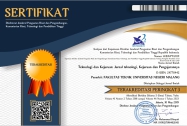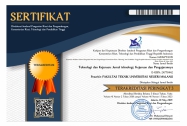Identification of Vocational High School Competency Based on Leading Potential of The Region in Batu City
Abstract
Keywords
Full Text:
PDFReferences
Argadewi. (2017). Pengembangan Sekolah Menengah Kejurusan (MK) Berdasarkan Potensi Wilayah Kabupaten Kediri. Jurnal Penataan Ruang, 4(1). doi: 10.12962/j2716179x.v4i1.2361
Besra, E. (2012). Potensi Wisata Kuliner Dalam Mendukung Pariwisata di Kota Padang. Jurnal Riset Akuntansi Dan Bisnis, 12(1), 74–101.
Direktorat Pembinaan SMK. (2016). Revitalisasi Pendidikan Vokasi. 53.
Van Roekel. (2017). A Guide to Four C. National Education Association.
Sujali. (2016). Pengelolaan Usaha Jasa Pariwisata Berbasis Pengembangan Masyarakat Pada Kawasan Ubud Bali. Pengelolaan Usaha Jasa Pariwisata Berbasis Pengembangan Masyarakat Pada Kawasan Ubud Bali, 22(2), 145–164. doi: 10.22146/mgi.13322
Hidayat. (2018). Peningkatan Kualitas Sumber Daya Manusia (SDM) Melalui Revitalisasi Pendidikan Vokasi-Kejuruan. Seminar Nasional Teknik Dan Pendidikan Teknik Otomotif 2018, 92–95.
Husna. (2013). Analisis Pengembangan Potensi Ekonomi Lokal Untuk Menguatkan Daya Saing Daerah Di Kabupaten Gresik. Jurnal Administrasi Publik Mahasiswa Universitas Brawijaya, 1(1), 72874.
Irfan. (2017). Seminar Nasional Mengeliminasi Citra Sekolah Second Choice.
Kemdikbud, P. (2017). Panduan Sinkronisasi Bidang Keahlian Di SMK Dengan Prioritas Potensi Unggulan Wilayah dan Tenaga Kerja.
KepMendiknas. (2002). Permendiknas Nomor 45 Tahun 2002, Tentang Kurikulum Inti Pendidikan Tinggi. Jakarta: Menteri Pendidikan Nasional, 1(2), 1–3.
Maryani. (2006). Geografi Dalam Perspektif Keilmuan dan Pendidikan di Persekolahan. Ilmu Pendidikan, 1–39.
Mukhdis, A., Putra, A. B. N. R., Nidhom, A. M., Dardiri, A., & Suswanto, H. (2017). Panduan Sinkronisasi Bidang Keahlian Di SMK Dengan Prioritas Potensi Unggulan Wilayah dan Tenaga Kerja.
Mulyadi. (2018). Identifikasi Potensi Wilayah Kabupaten Bandung Barat Sebagai Kawasan Geopark. 33–40.
Pemerintah, P. (1990). Peraturan Pemerintah RI Nomor 29 Tahun 1990, tentang Pendidikan Menengah. 1990, 56–79.
Peraturan Pemerintah Nomor 17. 2010. Peraturan Pemerintah Republik Indonesia Nomor 17 Tahun 2010 Tentang Pengelolaan Dan Penyelenggaraan Pendidikan.
Qurrotu. (2010). Konsep Pengembangan Sekolah Menengah Kejuruan (Smk) Berbasis Industri Di Kabupaten Sidoarjo. Jurnal Penataan Ruang ITS, 1–9.
Rencana Strategis Direktorat Pembinaan SMK 2015-2019. (2019). Rencana Strategis Direktorat Pembinaan SMK 2015-2019. Kemendikbud, 1–139.
Syarifah. (2019). Vocational Schools Based on Regional Potential in Indonesia. Advances in Social Science, Education and Humanities Research (ASSEHR), Volume 258, 258(Icream 2018), 29–31. doi: 10.2991/icream18.2019.6
Sutejo, Haris Anwar Syafrudie, S. (2012). Pemilihan kompetensi keahlian, tingkat pemahaman vokasional, dan prestasi belajar siswa smk kompetensi keahlian teknik bangunan. Jurnal Teko 35(2), 125–136.
Wagiran. (2015). Pengembangan Pendidikan Kejuruan Berbasis Potensi Daerah dan Sumberdaya Alam dalam Mendukung Continuing Vocational Education 29 April-2 Mei 2010. 1–9
Inpres. (2016). Instruksi Presiden Nomor 9 Tahun 2016 tentang Revitalisasi SMK dalam rangka Peningkatan Kualitas dan Daya Saing SDM Indonesia (pp. 1–10). pp. 1–10. Retrieved from https://kemdikbud.go.id/main/files/download/e451d9ec3a04121
Minister of Education and Culture. (2018). Struktur Kurikulum Sekolah Menengah Kejuruan (SMK)/Madrasah Aliyah Kejuruan (MAK). Presidential Instruction, (021), 307. Retrieved from http://psmk.kemdikbud.go.id/konten/3824/struktur-kurikulum-smk-perdirjen-dikdasmen-no-07dd5kk2018-tanggal-7-juni-2018
Sudira. 2009. Pendidikan Vokasi Suatu Pilihan. Journal UNY. Kurikulum dan Teknologi Pendidikan Retrieved from http://eprints.uny.ac.id/id/eprint/662
DOI: http://dx.doi.org/10.17977/um031v44i22021p118-123
Refbacks
- There are currently no refbacks.
Copyright (c) 2022 Teknologi dan Kejuruan: Jurnal Teknologi, Kejuruan, dan Pengajarannya
Teknologi dan Kejuruan: Jurnal Teknologi, Kejuruan, dan Pengajarannya
E-ISSN 2477-0442 (online)
Contact
Faculty of Engineering, Universitas Negeri Malang (UM)
Jl. Semarang No 5 Malang 65145, Building H5, 1st Floor.
Homepage: http://journal2.um.ac.id/index.php/teknologi-kejuruan
Email: teknologikejuruan.ft@um.ac.id

This work is licensed under a Creative Commons Attribution 4.0 International License.



2.png)
1.png)
1.png)
1.png)
4.png)
1.png)
.png)

3.png)
1.png)
1.png)


